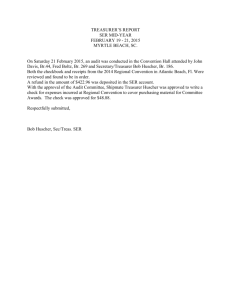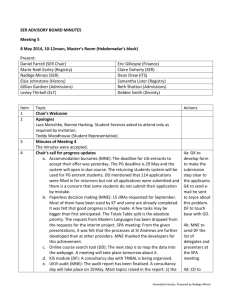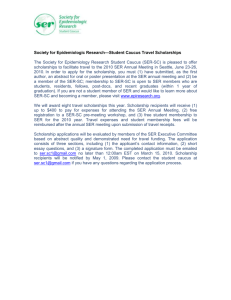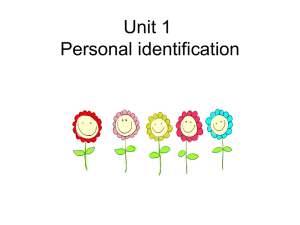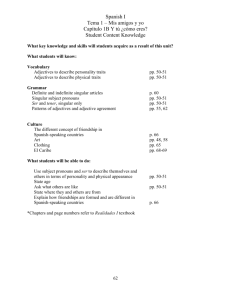pretoria summary - Social and Economic Rights Project
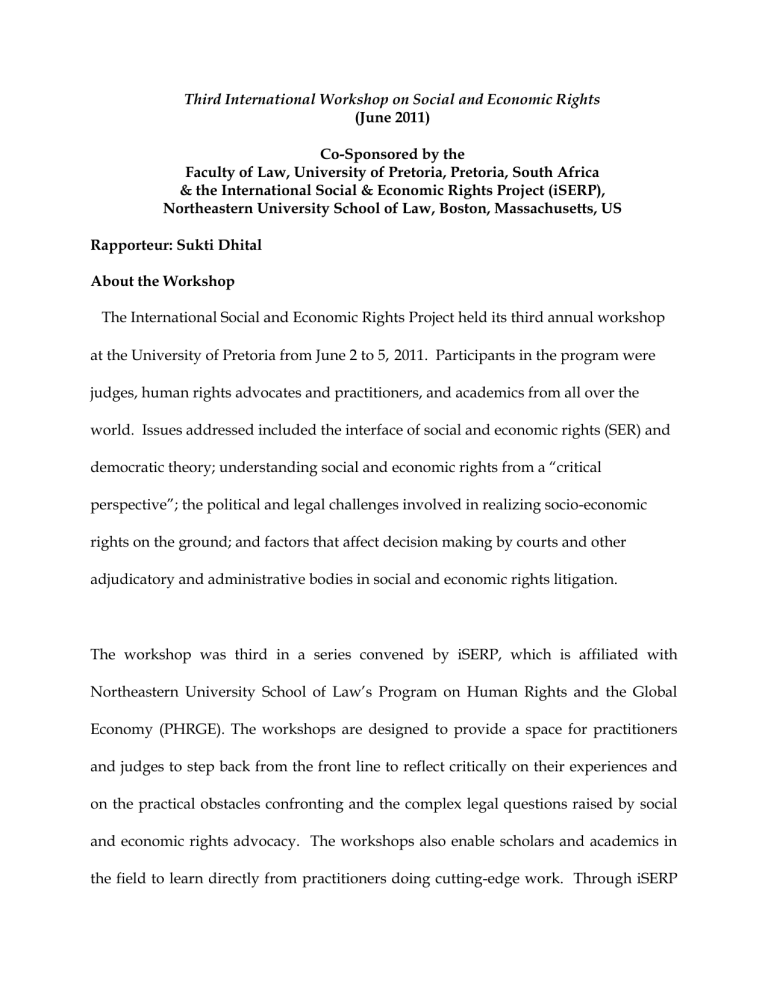
Third International Workshop on Social and Economic Rights
(June 2011)
Co-Sponsored by the
Faculty of Law, University of Pretoria, Pretoria, South Africa
& the International Social & Economic Rights Project (iSERP),
Northeastern University School of Law, Boston, Massachusetts, US
Rapporteur: Sukti Dhital
About the Workshop
The International Social and Economic Rights Project held its third annual workshop at the University of Pretoria from June 2 to 5, 2011. Participants in the program were judges, human rights advocates and practitioners, and academics from all over the world. Issues addressed included the interface of social and economic rights (SER) and democratic theory; understanding social and economic rights from a “critical perspective”; the political and legal challenges involved in realizing socio-economic rights on the ground; and factors that affect decision making by courts and other adjudicatory and administrative bodies in social and economic rights litigation.
The workshop was third in a series convened by iSERP, which is affiliated with
Northeastern University School of Law’s Program on Human Rights and the Global
Economy (PHRGE). The workshops are designed to provide a space for practitioners and judges to step back from the front line to reflect critically on their experiences and on the practical obstacles confronting and the complex legal questions raised by social and economic rights advocacy. The workshops also enable scholars and academics in the field to learn directly from practitioners doing cutting-edge work. Through iSERP
workshops and other programs, PHRGE aims to generate research and provide support for judges, attorneys, and activists doing human rights work and to encourage and assist law students to forge careers in human rights.
Threads of Conversation
Several themes emerged and repeatedly engaged the participants during the Workshop:
1. The possibility of tension between justiciable SER and traditional notions of representative democracy and separation-of-powers.
2. The possibility of tension between the universalistic aspirations of human rights discourse and the political, philosophical, and contextual choices inherent in application of human rights law.
3. Conflicts within human rights discourse, and the problem that implicit or explicit hierarchies of rights may set in.
4. The need to craft effective and creative litigation and advocacy strategies to expand and deepen SER and alter power relationships in society.
5. The need to incorporate critical approaches, fusing theory and practice, into law teaching concerning SER advocacy.
2
Public Plenary Session
The Workshop opened with a riveting and enlightening plenary session generously hosted by the Faculty of Law, University of Pretoria, and open to the public. Acting
Dean Anton Kok delivered a welcome greeting. The featured speakers were judges and practitioners from South Africa and Colombia, respectively. Moderated by Judge
Dennis Davis, High Court of South Africa, the panel consisted of Justice Zak Yacoob,
Constitutional Court of South Africa; Judge TM Masipa, High Court of South Africa;
Judge Clara Elena Reales, Constitutional Court of Colombia; and one of South Africa’s leading human rights practitioners, Advocate Geoff Budlender.
Discussion focused on and compared recent SER decisions in South Africa and
Colombia with an emphasis on judicial method, referring not so much to doctrinal questions but rather to the conscious and unconscious political, philosophical, and legal-cultural forces that drive courts. The speakers juxtaposed current South African and Colombian approaches to the conception of the proper judicial role, the respective understandings of what legal analysis is, and questions of party standing and remedies in SER cases.
Panel members were asked to reflect on the observation that particularly the SA
Constitutional Court is more comfortable providing robust remedies in “easy” cases
3
(e.g., those involving “negative rights, such as protection from inhumane evictions), but appears more timid in “harder” cases (e.g., those involving “positive rights” to the provision of social goods such as housing or water). Judge Reales observed that, contrary to the prediction of mainstream theory, the Colombian Constitutional Court has experienced rising legitimacy on account of its robust SER jurisprudence and its imaginative use of “structural remedies.”
Private, working sessions
The plenary session was followed by six private, working sessions over the ensuing two days.
Session 1: “What Do We Mean By a ‘Critical’ Approach to Social and Economic
Rights?
The first session, convened by Karl Klare, Northeastern Law School, aimed to identify themes and questions for discussion throughout the Workshop. Most participants share two premises or aspirations concerning SER, although we each formulate these assumptions in our own way. The first premise is that diffusing and enforcing SER is or can be a significant tool to achieve poverty-reduction and grass-roots mobilization of the powerless. The second is that human rights discourse and practice are sites of political contestation. These premises pose two sets of questions for investigation:
4
(1) Does it work? Can SER enforcement make a meaningful contribution to poverty elimination and/or can it provide a context or spark for grass-roots mobilization, and if so, how? and,
(2) What exactly do we mean when we say that we understand the human rights arena to be a terrain of political contestation? What are the jurisprudential implications of this approach? What are the consequences, if any, for analysis and advocacy? Session 1 asked participants to focus on these question-sets.
One speaker pursued the theme that the human rights approach is “an important, but incomplete and limited strategy.” Participants acknowledged that SER claims are often no more than rallying-cries (SER claims are often merely “performative”), given the lack of serious enforcement mechanisms in many jurisdictions. At all times, SER enforcement depends on the strength of stakeholder voice and mobilization, so less powerful stakeholders struggle to claim rights. Moreover, much of human rights discourse and doctrine assumes rather than challenges the background rules of property, tort, and contract that so powerfully structure social and economic life. At most, SER enforcement may carve out modest exceptions to the going legal regime and small enclaves of justice within unjust systems. One discussant commented on the paradoxes that “for every advance [in SER struggles], there is a loss” and that, depending on how deployed, rights-discourse may advance and/or limit freedoms.
5
Another participant focused on the political choices that inevitably accompany interpretation and adjudication of SER claims. SER do not have self-evident and selfdefining meanings and applications. A critical approach recognizes that interpretive work is always required in order to give meaning to rights concepts. A critical approach must therefore attend closely to the various styles and cultures of judicial reasoning.
Another speaker offered a brief intellectual history of critical approaches to rightsdiscourse over the past 150 years. The various threads of criticism, historic and contemporary, were located in three broad groupings: “substantive,” “strategic,” and
“discursive.” An example of a substantive critique is the claim that as a historical matter, the human rights tradition has been dominated by individualist, propertarian, anti-redistributive themes and insufficiently sensitive to the needs and concerns of women. A counterargument is that the past 25 years have seen a far-reaching transformation of rights discourse away from its natural law origins and toward a more plastic, inclusive, redistributive, and socially and culturally sensitive approach.
Examples of strategic criticisms, examined and debated throughout the Workshop, are the claims that rights-oriented approaches tend to privilege lawyers and distract from grass-roots struggle, and/or that conservative forces have proved adept in packaging their positions as “human rights” claims.
6
The discursive critique of rights discourse focuses on this difficulty. On the one hand, the legal cultures within which we work insist on a sharp law/politics distinction and condemn as illegitimate legal argument that appears to be inspired by ideologicallydriven preferences. Human rights discourse has a certain cachet within legal argument generally precisely because its tenets and principles are deemed to be universal and
“above” politics and for that reason entitled to a higher level of respect and authority than laws generated by the political process of the day. On the other hand, all sophisticated legal thinkers know that gaps, conflicts, and ambiguities are pervasive within human rights discourse (like all legal discourses), and that legal questions that arise because of gaps, conflicts, and ambiguities can only be resolved by resort to procedures, criteria, and judgments external to the frame of rights discourse. That is, such questions can only be resolved by weighing and balancing all relevant moral, social, and institutional considerations.
The dilemma is that our legal analytics will undermine the special cachet of rights discourse unless we are able to persuade judges and other decision makers that resort to morally or politically driven considerations within legal reasoning is inevitable and may be legitimate provided this is done self-consciously, self-critically, and faithful to a duty to be candid with the public about the nature of one’s reasoning processes.
The session then shifted to interactive discussion of a hypothetical involving a constitutional right of access to adequate housing in a developing nation. The
7
hypothetical is reprinted as an Appendix to this summary. Participants attempted to identify what aspects of their analysis of the problem, if any, employed a “critical approach” that is different from any other form of good legal work.
One participant noted that no abstract, distinctively left-leaning conception of human rights, could decisively resolve the case. Another commenter questioned whether our understanding of the duty of interpretive fidelity inclines us to be “too faithful to notions of consistency when dealing with fundamental injustices and exclusions that result from poverty?” Considerable discussion centered on “why it is that the assets and rights of poor people must be expropriated to generate resources for a developing society?” Why do we seem to take for granted that poor people’s rights and interests may be adjusted to serve the common good, but not the rights and interests of middleclass or wealthy people? With respect to generating resources to provide access to housing, for example, many fewer people would be affected if middle class assets were expropriated rather than those of the poor, but we instinctively know and internalize that – as a political matter – this is not going to happen. At the same time, poor people’s land is often expropriated to promote development of upscale housing, a practice that should be hugely problematical in a legal regime that enshrines social and economic rights. A speaker identified the special challenges to protection of SER that arise when, as in the hypothetical, private actors step into traditional roles of the government.
8
Discussion also engaged the problem that assisting specific groups or protecting certain rights often means disadvantaging other equally worthy groups or rights claims. This problem is illustrated by the potential for tension between the migrants and traditional communities in the hypothetical. The possibility was raised that robust SER struggles might exacerbate divisions within marginalized communities, or at least might bring these to the surface. One commenter remarked on the highly variable nature of what a legal or political community regards as “illegal.” For example, even advanced legal cultures treat encroachment on government land as “illegal,” while failure by the government to provide adequate housing to the poor is legally tolerated for separation of powers reasons or due to resource constraints.
Session II: “Realizing Social and Economic Rights On the Ground”
This session was led by Sandy Liebenberg, University of Stellenbosch. Participants reflected on the doctrinal and practical challenges of litigating SER cases, evaluating our successes and shortcomings, and setting goals for our advocacy, litigation, and research.
The discussion proceed along several axes, including: (1) how we select and frame our cases, and the impact of our case-selection and case-framing on outcomes; (2) what we can do as advocates to improve the quality and sophistication of the thinking and reasoning about SER conducted by judges and other decision makers; (3) how to promote creativity and innovation in remedies; (4) whether SER advocacy can have positive mobilization-effects in marginalized communities even when losses occur in
9
court; and (5) the symbolic and ideological impacts, positive and negative, of our SER work.
The first panelist discussed structural remedies imposed in a tutela proceeding filed on behalf of waste pickers in Colombia. A “neutral” law was passed limiting waste collection in public spaces which in practice had devastating effects on the fundamental rights of waste pickers, including their right to livelihood. Many tutelas were filed by individuals; however the Constitutional Court (on its own motion) “accumulated” these cases into one “structural” or “collective” proceeding. The Court sought experts and brought stakeholder groups together in an effort to build capacity to prescribe effective remedies. The Court ordered removal of certain limitations on participating in the industry and directed the government to reserve a place for the waste pickers to bid on recycling projects. The Court also held that appropriate relief must be provided to persons effectively cast out of the industry as a result of regulatory reform.
While these were important victories, the impact of the decision was weakened by failure of government compliance and the absence of strong social movements monitoring and enforcing compliance on the ground. Participants discussed whether and to what extent courts can play a positive role in mobilizing marginalized communities. At the same time, they expressed concern about whether heightened judicial intervention and “legalization” (professionalization) of social issues might have the opposite effect of excluding or weakening the voices of marginalized people.
10
Another panelist addressed the question why there has been so little litigation in India concerning the right to water. A right to water is well-established in domestic jurisprudence, but thus far the courts have not been given many opportunities to supply more than minimal content to this right. This problem was attributed to the common Indian practice of carrying out reform in access to water by administrative methods that leave considerable latitude to the executive and with legal instruments that are not legally binding on the key decision makers. The group explored the challenges of advocacy in this environment and underscored the need of human rights lawyers to focus on executive and administrative processes as well as court proceedings.
The next presentation concerned the African regional human rights system, with an update on progressive decisions recently issued by the Commission. While the
Commission has taken a more assertive role in SER adjudication, compliance and implementation problems continue to limit the impact of these decisions on the ground.
Among other problems, the Commission lacks a mandate to impose remedies. By contrast, the Optional Protocol to CESCR seeks to address this limitation.
Another panelist discussed the increase of urban demolitions and forced evictions in
India and a recent case on the matter in the Delhi High Court. The case involved a large-scale demolition affecting over 5,000 Delhi residents in which the demolition was
11
conducted without meaningful due process and in violation of a slew of legal rights.
The demolition was stayed by the legal action. However, the state did not fulfill its obligation to provide interim relief, and the authorities are reluctant to afford SER entitlements to “encroachers.”
A participant who was a leading advocate in the case discussed the impact of the landmark judgment in Occupiers of 51 Olivia Road, Berea Township and 197 Main Street,
Johannesburg v. City of Johannesburg & Others (Constitutional Court of South Africa,
2008).
1 There the Constitutional Court established an obligation of government to conduct some form of “meaningful engagement” with the occupiers prior to eviction.
One participant commented that the “meaningful engagement” requirement is an example of how rights-litigation can transform power relations and bolster the agency of marginalized and disadvantaged groups. On a generous reading, the Court placed at least some “power” in the hands of the people, thereby to some extent destabilizing the status quo of power relations in society. However, a participant met this observation with the question, what assets can courts bring to poor people that will meaningfully, not just symbolically, alter power relationships? Another participant commented that, overall, the Court’s deferential approach to the other branches amounted to judicial avoidance and an abdication of its responsibility to engage with the substantive parameters of the right to housing. The discussion underscored the gap between victories in principle and progress on the ground.
1 2008 (3) SA 208 (CC), 2008 (5) BCLR 475 (CC).
12
Session III: “Work in Progress”
The third session experimented with a new format for our group. Three iSERP participants circulated a work in progress in advance. The manuscripts were at different phases of completion—two were preliminary drafts; the third was nearing completion. Discussion in the session began by having a participant other than the author present the paper, followed by a very brief author’s reply.
The first paper, The Right to Property and Economic Development in India, is a prospectus for a larger project, a critical analysis of the Supreme Court of India’s treatment of property rights. The author contends that, contrary to the conventional view, the
Court’s jurisprudence in this field has remained largely consistent over the decades.
The conventional narrative is that prior to 1978, the Supreme Court was anti-poor and reactionary, and that the Court only began to issue pro-poor decisions, including decisions concerning property rights, following the advent of public interest litigation.
The paper argues that the Court embraces a fluid conception of development and sees the development process in India as largely influenced by international actors. As a result, the author tentatively concludes that a rights-based approach is unlikely to generate effective progress for poor people.
The second paper, The Role of Courts in the Quantitative ‐ Implementation of Social and
Economic Rights: A Comparative Study, focuses on emerging doctrine and decisional-
13
output in SER cases regarding the proper role of an apex court in reviewing legislative and executive measures to give effect to SER. The core of the paper is a comparison of two landmark decisions—the judgments, respectively, of the Federal Constitutional
Court of Germany in Hartz IV 2 and the Constitutional Court of South Africa in Mazibuko
& Others v. City of Johannesburg & Others.
3 Among other things, the paper contends that the doctrinal standard on the appropriate scope of judicial review that courts announce that they are applying in SER cases is not really a decisive factor in determining the outcome. Rather, what is crucial is the judiciary’s unstated and often unconscious
understanding of its role within a separation-of-powers framework.
Setting doctrinal niceties aside, the German and South African courts both purported to review the actions of other branches in giving effect to SER ostensibly on the basis of a
“reasonableness” exercise. Each judgment reaffirmed the premise that courts are institutionally ill-equipped to make precise, quantitative findings with respect to the provision of social goods (e.g., to place a cash amount on the sum needed to provide a subsistence minimum income consistent with human dignity or to determine in liters the minimum quantity of water needed to provide constitutionally adequate access to sufficient water). That is, both courts began from the assumption that it is for the legislative and executive branches, not the courts, to determine and set such figures, subject only to deferential judicial review.
2 The Hartz IV judgment is still not published. The unofficial citation is BVerfGE, judgment of 9
February 2009, 1 Bvl 1/09, 1 Bvl 3/09, 1 Bvl 4/09.
3 2009 ZACC 28; 2010 3 BCLR 239 (CC).
14
The author argues, however, that when one looks closely at how the respective courts understood what “reasonableness review” entails, how they conducted their review, and in particular, how closely they looked at the evidence of record, their approaches were markedly different. The German court extensively and methodically probed the evidence, whereas the South African court—at least insofar as the reader is told in the judgment—scarcely engaged with the evidence at all and offered conclusory findings of reasonableness. Thus, the meaning and practical consequences of doctrinal standards such as “reasonableness” and “proportionality” are hardly self-evident, and outcomes
(and remedies) turn on how a court gives operational content to a standard of review in its actual practice of scrutinizing the evidence.
The third paper, titled Emerging Models of Socio-economic Rights Adjudication: Lessons from
Home and Abroad provides a unique historical perspective on SER, chronicling challenges in SER enforceability and legitimacy posed by differences in political systems and ideologies. The paper argued that SER have recently been acquiring a more tangible quality, and that traditional distinctions between types of fundamental rights are breaking down. The paper also focused on the specter of indeterminacy inherent in SER, viewing resource allocation questions and the uncertainty of SER enforcement as genuine concerns. Lastly, the paper touched on the notion that comparative studies of SER cases do not provide universally applicable strategies and therefore that we need not identify a single model for SER enforcement. While agreeing
15
in principle that advocates ought to take advantage of whatever unique opportunities offered in their respective jurisdictions for advancing SER, the article inquires whether the inconsistent development of SER doctrine might raise problems for advocates over the long run.
Participants queried whether it is a mixed blessing that human rights discourse has become the dominant progressive ideology of our time, the problem being that the universal aspirations of the discourse may obscure or suppress contestable political and distributive choices and judgments that inevitably arise in the course of rights enforcement.
Session IV: Social and Economic Rights and Democracy
Frank Michelman, Harvard Law School, convened the next session on “Social and
Economic Rights & Democracy.” The session examined the question whether a “special incompatibility” exists between the enlarged vision of democracy that may be drawn from constitutional entrenchment of SER and the values and institutional understandings associated with traditional conceptions of representative democracy emphasizing majority rule. In particular, does SER entrenchment suggest new, perhaps broader roles for courts that conflict with traditional conceptions of legislative supremacy? Might a foundational social and legal commitment to uplifting marginalized and structurally disadvantaged communities conflict with traditional notions of democracy such as one-person/one-vote? Or is the opposite true? Is special
16
attention, including judicial attention, to the needs and aspirations of the poor and marginalized necessary because structural inequalities influence who gets to give meaning and content to rights, and who has access to and effective power to “claim” from the legal process.
Put another way, participants were asked to reflect on whether the constitutional entrenchment of SER is constitutive of or undermines democracy as we are coming to understand it in the 21st century. The general iSERP orientation is to assume that robust conceptions and enforcement of SER are not antagonistic with but constitutive of democracy; however participants acknowledged that this assumption is not self-evident and needs to be addressed. Some participants cautioned that we must be attentive to the dangers as well as democratic potential of non-majoritarian thinking.
Recurring sub-themes in the conversation included that the counter-majoritarian dilemma is not unique to SER enforcement but potentially arises in all rights adjudication; that rights-enforcement occurs in many arenas besides the courts, so that courts might have new roles in guaranteeing access to channels of political contestation in addition to or as distinct from their role in enforcing SER as such; and that, properly framed, judicial review in SER cases may provide a forum for dialogue between the branches that enriches rather than detracting from democracy. Some participants argued that these questions about SER, democracy, and judicial review come to a head most clearly with respect to the question of remedies as distinct from more abstract,
17
substantive doctrine. Another urged that we resist thinking of SER enforcement in binary terms (courts vs. parliament) and that, as activists and advocates, we engage with multiple sites of democratic participation to realize SER.
National political context was addressed. Some discussants asked whether either democracy or meaningful SER enforcement are compatible with a neoliberal vision of capitalism. A participant insisted that we need approaches that go beyond the takenfor-granted “common wisdom” and that “think the unthinkable,” for example, by advocating for solutions to homelessness that contemplate expropriation of middleclass property. One presenter focused on these legal and philosophical issues as they arise in connection with the ongoing “Naxalite” phenomenon, a violent social-change movement in India that challenges the state (and judiciary) in the name of democracy and SER.
Session V: “Critical Issues in SER Advocacy”
The fifth session, “Critical Issues in SER Advocacy,” led by Colm O’Cinneide,
University College of London, provided an opportunity for critical reflection on several difficult issues currently confronting SER advocates. The session centered on the challenges SER advocates face in deciding how to frame and develop their arguments before courts and other adjudicatory bodies.
18
The opening presentation discussed issues arising in Colombia, particularly how the concept of “minimum core” is treated in that context. Also, through the Constitutional
Court’s doctrine of “connectivity,” social and economic rights are viewed as linked to a right to a “minimum level of sustenance,” which is in turn regarded as a principle of human dignity. It was remarked that separation-of-powers concerns are relatively speaking less acute in Colombia, and courts there retain considerable discretion regarding the implementation and enforcement of SER. The Constitutional Court also has great discretion regarding the tutela cases it will hear. For example, the Court deems inadmissible cases lacking a participatory component.
The next presentation discussed challenges in adjudication of SER claims in India. The growing trend toward public-private partnerships, attributed in part to the forces of globalization, has made it increasingly difficult to hold states accountable for SER violations. The presenter also discussed a growing hostility to public interest litigation
(PIL) in India, where suits are routinely dismissed on procedural grounds contrary to the spirit and purpose of PILs. For this reason, advocates are beginning to frame SER cases as individual petitions in order to ensure claims that the State High Courts will continue to address them.
The next presentation centered on what standards of review such as reasonableness mean within various adjudicatory contexts. The group discussed whether progressive advocates have an identifiable interest in promoting either reasonableness or
19
proportionality standards of review. The discussant noted that “reasonableness review” is not viewed in all courts as being incompatible with strong notions of entitlement. The presenter also focused on the anticipated ratification of the Optional
Protocol on CESCR. The Protocol, it was observed, not only provides mechanisms for policy-review, but also serves as a rights-claiming mechanism. The Protocol transforms
SER into justiciable entitlements, permitting the voice of the claimant to be heard in SER adjudication.
The SER-obligations of private companies was discussed in connection with a decision involving the regulation of utility companies in Nova Scotia. The government was ordered to regulate private actors by imposing affirmative obligations on them to subsidize and accommodate persons with disabilities. The case raised interesting questions about relationships between classes and the social construction of poverty.
The next presentation focused on an analysis of Supreme Court and High Court decisions dealing with equitable delivery of health services in India. The analysis identified challenges faced by petitioners and advocacy groups, including access to justice questions and the difficulties with self-funding and external-funding models.
Discussion ensued about the differences between various tribunals and courts in receptivity to SER claims (citing an unfortunate outcome in an SER claim on environmental loss and livelihood filed in an administrative tribunal). The case
20
highlighted how outcomes and remedies may be significantly affected by a tribunal’s substantive approach to rights and its evidentiary and procedural rules.
Another participant focused on the desirability and efficacy of using equality rights as a platform for advancing SER claims in South Africa. The question arises whether a claim may be lodged that a certain level of social and economic inequality is constitutionally intolerable. Discussion also centered on strategies of launching a gross inequality case on equality grounds. Participants addressed how questions such as “what is a reasonable amount of access to housing? A reasonable amount of access to food?” play out in the discourse of equality, and whether an equality-framing of SER questions can avoid the recognition that SER cases are still fundamentally about resources and resource constraints.
Session VI: “A Critical Assessment of Social and Economic Rights, Legal Education and the Legal Academia”
The final session was convened by Esteban Hoyos-Ceballos of Eafit University Law
School and Cornell Law School. The session involved a broad discussion on the role of the legal academy in the promotion and protection of SER.
The presenter offered a model framework for international human rights clinical work.
The framework was built on the experiences of a project on the “right to free education”
21
in Colombia, after the Constitutional Court declared that primary education must be free. The paper discussed the processes of determining goals, formulating strategy with alliance partners, and reflecting with partners and students on the work throughout the process. The paper also recognized challenges in preserving institutional memory, geographic distance, and developing cross-cultural competencies.
Discussants commented on the varying clinical structures in different states, noting the lack of domestic human rights clinics in places like India. In such instances, there is a need for increased partnerships between international clinics and local NGOs to build capacity. SER clinics were viewed as potential agents for empowering students and, more ambitiously, spurring social mobilization and monitoring the implementation of remedies.
The session also focused on the role of academics, specifically how critical approaches can be injected into legal teaching as a counterweight to conventional formalist and uncreative pedagogy. Students should be presented with (and hopefully inspired by) transformative visions of lawyering. They should learn that every legal rule or context implicates and reflects power relations. The group discussed how law teachers can make the struggles of the poor come alive for students, and how academics might address the conventional curricular prejudice that constitutional law and international law are “add on” or boutique courses.
22
Participants shared experiences in their respective universities regarding the merger of theory and practice in legal education. The importance of teaching students the capacity to view claims and cases through multiple, different lenses was emphasized.
Law teaching should challenge and undermine rigid disciplinary barriers.
A participant remarked that we have a “huge fight” on our hands to establish a critical approach to legal education and to teach students that alternative, transformative visions of lawyering are possible.
Summation and Conclusions
The Third Workshop yielded the following key points and conclusions:
Adjudication of economic and social rights can promote democracy and greater inclusion of marginalized members of society
The justiciability of SER is not inherently antagonistic to majoritarian conceptions of representative democracy; however SER advocates must devote close attention and concern to judicial qualms about the legitimacy of robust enforcement of SER
23
Critical approaches, fusing practice and theory, must be injected into legal teaching to advance SER advocacy
Continuing attention is needed to the tension between the universalistic aspirations of human rights discourse and the political judgments and contextual concerns that unavoidably affect SER enforcement.
“Meaningful engagement” (Olivia Road) and novel rights-claiming mechanisms can have significant effects on power relations
Comments and Future Projects
The workshop concluded with a discussion led by Lucy Williams and Karl Klare about future collaborations and projects and next steps for continuing iSERP’s work. Some key points made by participants include:
The participants decided to continue meeting in this format, with the next workshop tentatively scheduled for London, UK, in June 2012.
The participants wish to maintain the small size and informal and nonhierarchical atmosphere of the workshop.
24
iSERP will work with ESCR-NET to increase database of ESCR decisions. The
NUSL Project on Human Rights and the Global Economy (of which we are a subproject) is now a member of ESCR-NET.
A subgroup of members collaborating on a book project met to develop plans.
A subgroup met to discuss launching a new project on Engaging with Strategic
Litigation and Adjudication under the new Optional Protocols to the ICESCR and the Convention on the Rights of Persons with Disabilities (CRPD).
Malcolm Langford from Norwegian Centre of Human Rights expressed interest in collaboration with iSERP.
Participants
Danie Brand, Senior Lecturer, Department of Public Law, University of Pretoria,
South Africa
Geoff Budlender, Advocate at the Cape Town Bar
Natalia Ángel Cabo, Director, Program of Action for Equality and Social
Inclusion, Universidad de los Andes, Colombia
Lilian Chenwi, Associate Professor, Witwatersrand University School of Law,
South Africa
25
Philippe Cullet, Professor of International and Environmental Law at the School of Oriental and African Studies, University of London
The Hon. Dennis M. Davis, Judge of the High Court of South Africa (Western
Cape)
Sukti Dhital, Lawyer, Human Rights Law Network, India
Esteban Hoyos-Ceballos, Assistant Professor of law, Eafit University Law School,
Colombia; JSD Candidate, Cornell Law School
Serges Alain Kamga, Phd candidate, Centre for Human Rights, University of
Pretoria, South Africa
Karl Klare, Professor of Law, Northeastern University School of Law
Sandra Liebenberg, H.F. Oppenheimer chair in Human Rights Law, Law Faculty of the University of Stellenbosch, South Africa
Kirsty Mclean, member of Johannesburg Bar, Visiting Senior Fellow at the Centre for Applied Legal Studies, Witwatersrand University School of Law, South
Africa
The Hon. TM Masipa, Judge of the High Court of South Africa (Johannesburg)
Frank Michelman, Robert Walmsley University Professor, Harvard Law School
Colm O’Cinneide, Senior Lecturer in Law, Faculty of Laws, University College of
London
Bruce Porter, Executive Director, Social Rights Advocacy Centre, Ontario,
Canada
26
Usha Ramanathan, International Environmental Law Research Centre and
Indian Law Institute, Delhi
Clara Elena Reales, Auxiliary of Justice, Constitutional Court of Colombia
Jayshree Satpute, Advocate, Human Rights Law Network, India
The Hon. Justice Thembile Lewis Skweyiya, Constitutional Court of South Africa
Namita Wahi, SJD student, Harvard Law School
Lucy Williams, Professor of Law, Northeastern University School of Law
Stuart Wilson, Director of Litigation, Socio-Economic Rights Institute of South
Africa
Justice Zak Yacoob, Honorable Justice of the South African Constitutional Court
Katie Young, Senior Lecturer, ANU College of Law, Australian National
University
27
Appendix
Hypothetical Case: Housing as a Human Right 4
The Republic of Mandela adopted an “advanced,” democratic constitution 20 years ago after a long period of authoritarian rule. The new constitution includes the following, judicially enforceable provisions:
§ 10. Everyone has inherent dignity and the right to have their dignity respected and protected.
§ 24. (1) Everyone has the right to ecologically sustainable economic and social development that will improve the standard of living of our people, promote the ability of all to realize and fulfill the human rights contained in this Bill of Rights, and will protect the environment for the benefit of present and future generations.
§ 25. (1) No natural or juristic person shall be deprived of property without due process of law.
(2) No natural or juristic person shall be deprived of property without just and equitable compensation reflecting an equitable balance between the public interest and the interests of all those affected, having regard to all the circumstances. For purposes of this section, the public interest includes the nation’s commitment to land reform.
§ 26. (1) Everyone has the right to have access to adequate housing. Government shall take reasonable measures to achieve the progressive realisation of these rights.
(2) No one may be evicted from their home, or have their home demolished, without an order of court finding that the eviction or demolition is lawful and, considering all relevant circumstances, can be carried out humanely.
These rights apply “horizontally”—a right “binds a natural or a juristic person if, and to the extent that, it is applicable, taking into account the nature of the right and the nature of any duty imposed by the right.” Judicial review in the social and economic rights field is ordinarily conceived as a reasonableness inquiry with the following caveat: to be reasonable, governmental measures to achieve progressive realisation of a social or economic right must include a component that caters to those in most desperate need relative to the right in question.
Mandela was still a predominantly rural country 75 years ago. Uncoordinated and exploitative development measures taken by corrupt regimes severely degraded
Mandela’s once self-sustaining agricultural sector, provoking massive migration from the rural areas to the cities. In 1925, Slovo, the nation’s capital, was a sleepy town with
4 This hypothetical is based on and borrows freely from Felix Morka, “A Place to Live: Resisting Evictions in
Ijora-Badia, Nigeria” and Duncan Kennedy, “Commentary on Anti-Eviction and Development in the Global
South,” both appearing in Lucie White & Jeremy Perelman (eds.), Stones of Hope: How African Activists
Reclaim Human Rights to Challenge Global Poverty, Stanford University Press, 2011. The subtlety and nuance of these papers has been entirely eliminated in this crude, primitive, and simplistic rendition.
28
100,000 residents. Today it is one of the largest cities in the world (population 15 million and growing). The elites and middle-class live near the city centre, which is surrounded by vast slums and informal settlements. The housing shortage is acute.
Off-shore oil reserves were discovered 10 years ago. Elites have money to spend, as do the growing number of foreign professionals who have taken up residence in Slovo.
Mandela has undergone rapid, chaotic, and inegalitarian economic growth ever since.
Tambo, a slum on the outskirts of Slovo, is home to 50,000 residents. Portions of Tambo were originally tribal lands passed down for generations under customary law. While many Tambo residents are occupiers with no claim to the land, many others hold bona fide legal rights and interests in the land that they acquired from landholding families, indigenous communities or local authorities, or by inheritance. Tambo has some wellconstructed dwellings. A majority of residents live in shacks cobbled together from scraps of corrugated metal and wood. Infrastructure (running water, sanitation facilities, solid waste disposal, health clinics) is almost non-existent. Tambo continues to grow due to continuing migration from rural areas.
Tambo was neglected by developers because of its location and flooding problems. The situation has changed. Tambo happens to be located mid-way between the new Slovo
International Airport and a new residential and commercial complex related to the oil business. A World Bank project that caused evictions and relocations in other parts of the city cured the flooding problem. Leviathan Builders, Ltd. (LB), a private developer, sought to acquire the land comprising Tambo to build high-income housing and related commercial facilities. LB estimated that the project would raise property values in
Tambo by $10 million, net of construction costs and normal bribes, and assuming that displaced residents would at most receive token compensation based on current market values. Activists discovered that LB planned to style its project a “Public-Private
Partnership” and use its political connections to get local authorities to evict most
Tambo residents and demolish their properties, with little or no compensation. This was a common development strategy under the old regime.
Halt Evictions & Respect Our Homes (HEROH), an activist group, launched a mass movement opposing LB’s plan under the slogan “Housing is a Human Right.” This approach empowered the residents and helped bridge divides between cultural and religious groups. The campaign was successful beyond expectation due to wide community support, skillful leadership, and first-rate legal and public-relations capacity. Five thousand Tambo residents committed themselves to place their bodies in the way of the bulldozers should evictions began. HEROH brought suit in the High
Court against LB and local officials seeking to halt the project.
The High Court temporarily enjoined the project and ordered all stakeholders and the relevant government officials to participate in a structured engagement exercise. LB
29
and its cronies entered these talks anxious to avoid the negative publicity and political fallout that would inevitably follow in the wake of a mass eviction by force. In due course, LB, government officials, HEROH, and most other stakeholders agreed to an alternate development plan for Tambo, which provided –
• LB will construct a less ambitious, high-income housing complex on a smaller tract of land than originally planned. Some, but far fewer Tambo residents will be evicted. Their houses will be demolished, and they will receive modest compensation and relocation-assistance at LB’s expense.
• LB will contribute $3 million to a community development corporation (CDC) governed by representatives of Tambo under the supervision of the court. CDC will use part of this money to upgrade infrastructure throughout Tambo and part to construct new “social” housing complexes structured as limited equity cooperatives.
5
Those displaced from Tambo will have priority access to the new housing. LB and CDC will reinvest a portion of future rents in further improvements in Tambo.
• CDC will work with local authorities to establish enforceable limitations on inmigration to Tambo. This is necessary because un-controlled in-migration will quickly lead to overcrowding and dissipate any gains realized under the plan.
LB’s experts estimate that this alternate project will yield a surplus of about $5 million net of construction costs, bribes, subsidies to the community, and compensation costs.
The stakeholders and government officials ask the High Court to approve the plan.
Three NGO-stakeholders urge the court to reject the plan:
• Grass-roots Militants (GRM) argues that the evictions and demolition contemplated by the plan would violate the Constitution.
• Migrant Movement (MM) represents the interests of recent migrants who wish to be reunited with loved ones still in the rural areas; MM argues that the proposed controls on further in-migration would violate the Constitution.
• Traditional Owners (TO) represents individuals with claims of title to parcels that will be taken and ceded to CDC. TO argues that it would be unconstitutional to
5 A limited equity cooperative is a form of housing tenure in which the resident never acquires title. Title to the land is held in trust by a non-profit entity; the structures are owned by a co-operative. The residents’ interest is in the form of shares in the co-op. Residents collectively manage the housing complex pursuant rules contained in a charter enforced by the non-profit. The co-op must reimburse a resident who departs for the purchase price of his/her shares, increases in value attributable to improvements, and sometimes a share of equity appreciation, if any. If the market value of the shares had declined, the resident takes the loss unless the co-op charter provides for a reserve fund. The co-op selects new resident-members to whom it sells the shares released by the departing resident. Residents lack the legal power to sell their shares, and transfer of shares by inheritance is restricted.
30
replace the traditional land tenure system with a legal regime (the limited equity cooperative) in which in individuals may never acquire title to the land.
Must the court approve or reject the plan, in whole or in part? Suppose the court wishes to decide the matter within a “human rights framework.” What would that look like?
31
